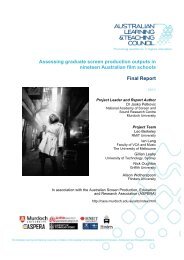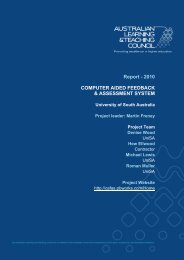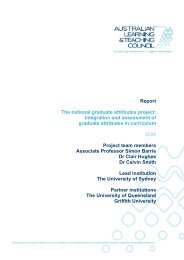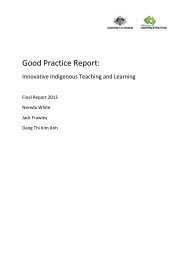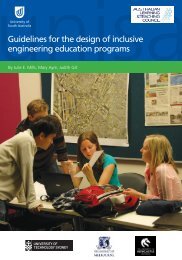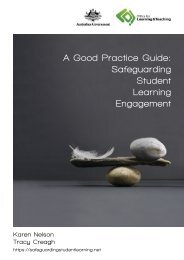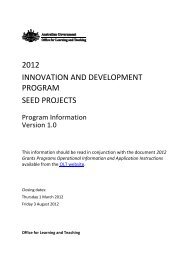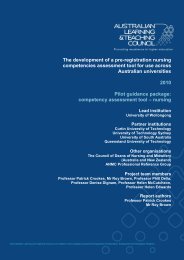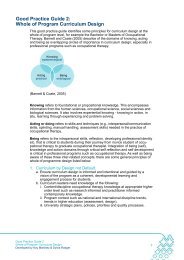Commissioned Strategic Projects - Office for Learning and Teaching
Commissioned Strategic Projects - Office for Learning and Teaching
Commissioned Strategic Projects - Office for Learning and Teaching
Create successful ePaper yourself
Turn your PDF publications into a flip-book with our unique Google optimized e-Paper software.
6.6 Project Leaders <strong>and</strong> Project Teams<br />
The project leader(s) must take significant intellectual responsibility <strong>for</strong> the proposed project, its<br />
design, conduct <strong>and</strong> results. This requires a serious time commitment (usually at least 20% of the<br />
leader’s time).<br />
Individuals may not hold the substantive responsibility (e.g. project leader/director/fellow) <strong>for</strong> more<br />
than two OLT grants concurrently unless the PVC/DVC (Academic) approves a greater commitment<br />
<strong>and</strong> provides details of how the time will be allocated to enable individuals to carry out their<br />
responsibilities to the projects. While this restriction does not apply to project team members, care<br />
should be taken by individuals not to over commit.<br />
The OLT acknowledges that project leaders <strong>and</strong> team members will be required to allocate time to the<br />
successful implementation of a project. All project proposals must include a letter from the respective<br />
head of school/department <strong>for</strong> each team member stipulating support <strong>for</strong> teaching relief or relief from<br />
normal duties <strong>for</strong> the team member to participate in the project. Letters of support must be included<br />
whether or not teaching relief or relief from normal duties has been requested from the OLT.<br />
Project teams are encouraged to include one or two early career academics as substantive members<br />
of the project team. All nominated project team members should be in agreement with the proposal<br />
at the time of submission. If it comes to the attention of OLT that nominated team members are not in<br />
agreement or aware of the application, the proposal will be deemed ineligible <strong>for</strong> that funding round.<br />
6.7 Collaborative <strong>Projects</strong><br />
Collaboration between higher education institutions <strong>and</strong>/or relevant other bodies is encouraged.<br />
Applications from consortia will need to be submitted under a lead institution which must be a higher<br />
education institution eligible to receive a grant under these guidelines. The lead institution must<br />
ensure each named collaborating institution/organisation has agreed to have its name put <strong>for</strong>ward as<br />
a collaborating institution be<strong>for</strong>e submitting a project proposal. Failure to ensure the agreement of<br />
named collaborating institutions/organisations may result in the application being deemed ineligible<br />
by the OLT.<br />
The lead institution must be authorised to act on behalf of all members of the consortia or<br />
collaborative group, <strong>and</strong> enter into agreements which are binding on them. For the purposes of the<br />
application, all consortia members <strong>and</strong> the lead institution should be clearly identified.<br />
Formal collaborations or partnerships must be acknowledged in documentation regarding the project.<br />
Collaborating institution(s) will contribute substantially to the project, usually through a project team<br />
member. Where partners are not represented on the project team, a clear rationale should be<br />
included in the proposal to explain this absence. To acknowledge this commitment, project proposals<br />
must be endorsed in writing by way of a letter of endorsement from the Vice-Chancellor, or<br />
equivalent, of all collaborating /partner institutions be<strong>for</strong>e submission.<br />
6.8 Single Institution <strong>Projects</strong><br />
In keeping with the principles of diversity, collaboration <strong>and</strong> high impact, the principles <strong>for</strong> funding<br />
single institution projects are:<br />
<br />
The issue, idea or approach must be of importance to the higher education sector.<br />
13



